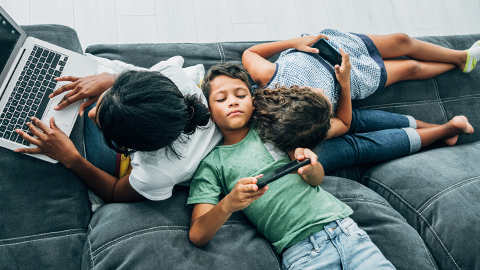Table of Contents
With the COVID-19 pandemic wreaking havoc worldwide and keeping us all in mandatory quarantine, screen time on smart devices, whether its a phone, tablet, or desktop are expected to increase. When you’re a parent, it’s going to be a challenge to keep your children from spending too much time on the Internet and some things you can do to protect kids online.
We are in a unique situation right now – that much is true. Unique situations need unique solutions, that’s why it may be more productive as well as easier for you to give your children an all-access pass to their gadgets until the time comes when we get back to our normal lives.
But giving them freedom on the Internet doesn’t instantly mean you’d let them go wild in it. The Internet is a vast world on its own, filled with content which is inappropriate and sometimes too strange and upsetting for a child to see. As a parent, you need to set up some restrictions, and here are some things you can do:
Make sure your antivirus software is up to date
An updated antivirus software is your first line of defense against online attacks like viruses, trojan horses, and malware. Children, especially kids under the age of seven, tend to download anything that they like, without checking the veracity of the site they’re downloading from. If you have Windows or Android devices, you can set-up automatic updating so that you won’t have to worry about obsolete antivirus software.
The best antivirus software is one that works effectively in the background without you checking now and then if it is doing its job. For Apple users, while it’s a great practice to install an additional scanning software that will warn you of some suspicious files, the threat of viruses for the operating system is relatively low compared to its counterparts.
Norton 360 Premium is still the best choice for all-around protection of desktop and laptops while Kaspersky trails behind. Trust us when we say you’d want to buy the software itself and not settle for the free versions because it will give you more bang for your buck in the long-run.
Put up privacy settings
This is not only important but a necessity. Privacy settings and controls on every device your child/children are using mean that you have the absolute control over the monitoring of their activities. Parental controls are preset settings on most devices nowadays, so you won’t have to worry about manually setting it up.
Privacy settings also afford you the peace of mind that your kids won’t go to or access sites which are PG-13. We all know how curious children are, and how crafty as well as resourceful they can be when it comes to circumventing the rules set. For privacy settings to be more effective, don’t inform your children that you’ve set it up, instead, explain to them the realities of some sites on the Internet.
Create online moments
By creating online moments, you interact with them online more. This means you’re on top of their activities, and it will let them know that you’re cool but ever-present. Studies on kid’s behavior show that kids behave enthusiastically when they’re supported. Let’s say you’ve allowed them a social media profile – if and when they post, make sure to engage. You can comment or like their status or pictures, but don’t take it too far.
If possible, monitor their accounts. For kids under 18, if you can, have their log-in credentials so that you can see what they’re following, the people they’re interacting with, and more. Put in place a severe consequence on attempts to create profiles other than what you’ve approved. On top of this, let them understand your stance on mature matters by sitting them down and talking to them.
Takeaway
Protecting your children in this unique time should be one of your top priorities. There’s no telling when the quarantine will end, so it’s important to be the person they can rely on in terms of providing them with the answers to their questions. Suffice it to say that having the Internet, as well as the smart devices that we have today, are a great relief. But these come with inherent risks, so always err on the side of caution.









